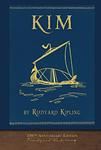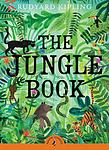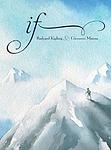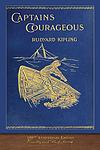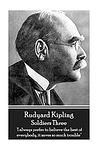Rudyard Kipling
Rudyard Kipling was an English journalist, short-story writer, poet, and novelist. He was born in Bombay, India, on December 30, 1865, and is best known for his works of fiction, including 'The Jungle Book' (a collection of stories which includes 'Rikki-Tikki-Tavi'), 'Kim' (a tale of adventure), and many short stories, including 'The Man Who Would Be King'. His poems include 'Mandalay' and 'Gunga Din'. Kipling was one of the most popular writers in the United Kingdom in the late 19th and early 20th centuries and was awarded the Nobel Prize in Literature in 1907. His children's books are enduring classics of children's literature.
Books
This list of books are ONLY the books that have been ranked on the lists that are aggregated on this site. This is not a comprehensive list of all books by this author.
-
1. Kim
"Kim" is a thrilling adventure set in India during the height of the British empire. The story follows the life of a young Irish orphan, Kimball O'Hara, who grows up on the streets of Lahore. Kim's life takes a dramatic turn when he becomes involved in the 'Great Game', the political conflict between Russia and Britain in Central Asia. Guided by an old Tibetan Lama on a spiritual quest, Kim is recruited by the British secret service and sent on a dangerous mission across the Himalayas. The novel explores themes of identity, imperialism, and East vs. West.
-
2. The Jungle Book
This classic work is a collection of stories set in the Indian jungle, where a human child, Mowgli, is adopted and raised by a pack of wolves. The book follows Mowgli's adventures and lessons learned from his animal friends and foes, including the wise bear Baloo and the cunning panther Bagheera. The book also includes other tales of animals and humans coexisting in the wild, showcasing themes of survival, morality, and the law of the jungle.
-
3. The Man Who Would Be King
This novella follows the journey of two British adventurers in British India who become kings of a remote part of Afghanistan. After persuading local tribes to follow them through a mix of bravado and technological superiority, their rule is initially successful. However, their ambition leads to overreach when one of them decides to take a wife, breaking a local religious taboo. Their once-loyal subjects turn against them, leading to a dramatic and tragic conclusion that serves as a cautionary tale about the dangers of imperialism and the limits of hubris.
-
4. If: A Father's Advice to His Son
This book is a collection of paternal wisdom, offering advice and guidance to a young man navigating through life's challenges. The author shares insights on various life aspects such as integrity, humility, patience, loss, and triumph. The book serves as a timeless guide to personal development, moral integrity, and character-building, emphasizing the importance of these virtues in achieving success and fulfillment in life.
-
5. Captains Courageous
This classic novel follows the transformative journey of Harvey Cheyne Jr., a spoiled and wealthy American teenager who falls overboard from a luxury ocean liner and is rescued by a fishing vessel on the Grand Banks of Newfoundland. Under the tough but fair guidance of the ship's captain and the hardworking crew, Harvey is forced into labor to earn his keep. Through his experiences at sea, facing the harsh realities of life and the value of honest work, Harvey undergoes a profound character transformation. The story is a vivid portrayal of maritime life and a timeless tale of adventure, discipline, and personal growth.
-
6. Soldiers Three
The book is a collection of short stories centered around three British soldiers serving in India during the British Raj. Through a series of humorous and adventurous tales, the narrative explores the camaraderie, exploits, and mishaps of the trio as they navigate the complexities of military life and the cultural encounters of colonial India. The stories are known for their vivid characterizations and the author's keen observations of the British military and Indian society, offering insights into the attitudes and interactions between different cultures during the period of British imperialism.
-
7. Complete Verse
This comprehensive collection brings together the entire range of verse from a celebrated British author, known for his deep engagement with the British Empire and its complexities. The anthology showcases a variety of poetic forms and themes, from the author's early, vivid ballads of imperial life, to his later, more reflective poetry. It includes his most famous works that have entered the public consciousness for their rousing rhythms and memorable lines, as well as lesser-known poems that reveal a more intimate and contemplative side of the poet. The collection is a testament to the author's versatility and enduring impact on English literature, offering insights into the cultural attitudes of his time while also exploring universal themes of adventure, courage, and identity.
-
8. Puck Of Pook's Hill
"Puck of Pook's Hill" is a collection of fantasy short stories woven together by a common thread: the magical encounters of two children, Dan and Una, with Puck, the last of the ancient English faeries. Set in the Sussex countryside, the children are taken on a series of adventures through time, meeting a cast of characters from different periods of English history, including Romans, Vikings, and Norman knights. Through these tales, the book explores themes of history, culture, and the passage of time, blending myth with reality to create a tapestry that celebrates England's rich heritage.
-
9. Collected Stories
This anthology brings together a diverse range of tales by a prominent British author, known for his keen observations of the British Raj in India and his storytelling prowess. The collection spans various genres, including adventure, military life, and the supernatural, all infused with the writer's characteristic wit, vivid characterizations, and an underlying examination of complex moral issues. The stories often reflect the contradictions and imperialistic attitudes of the Victorian era, offering readers a multifaceted look at colonial society, the human condition, and the intricate tapestry of life during that period.
